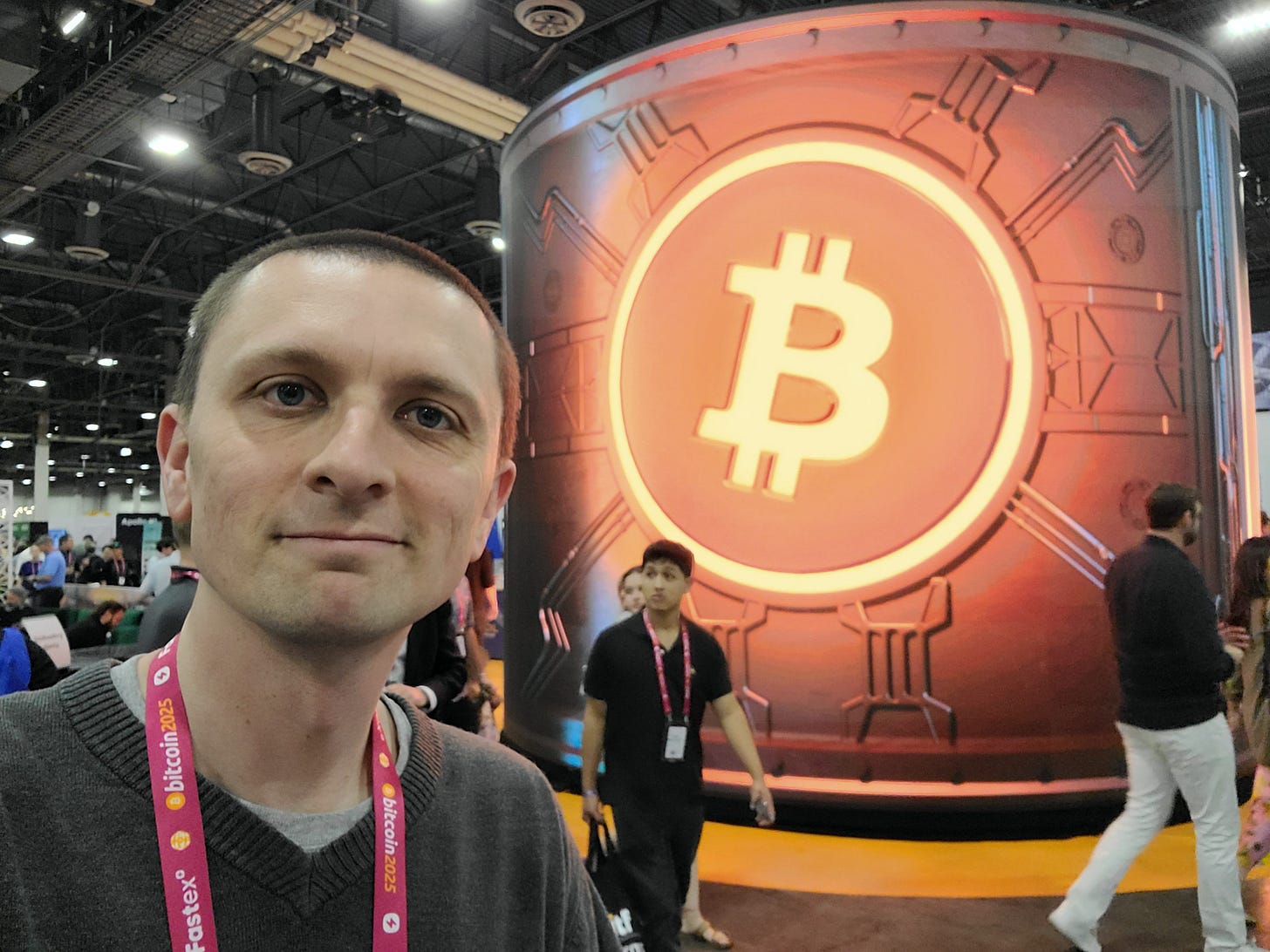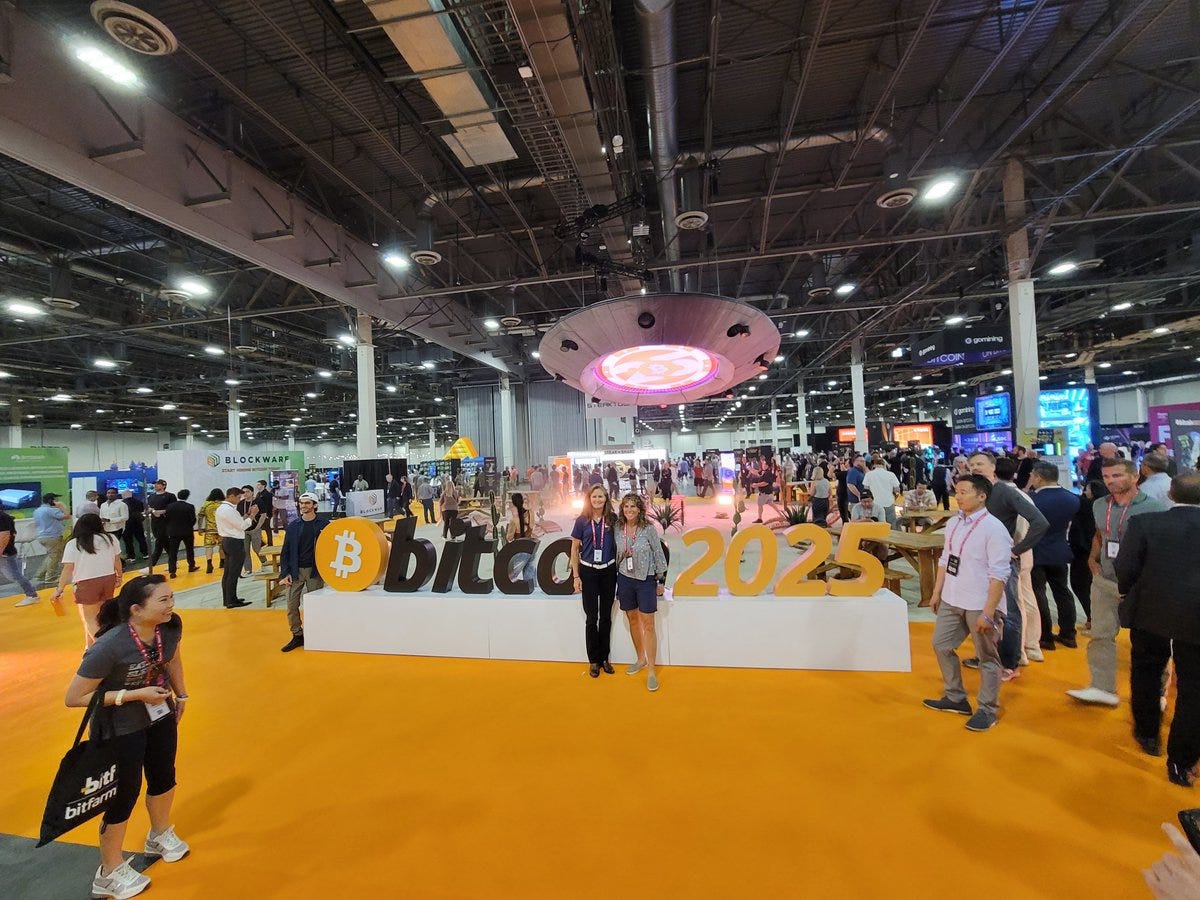"Bitcoin is digital. You are not."
Brief reflections from speeches by JD Vance and Peter Schiff
Hi all. With about 35,000 other people from all over the world (and you can tell they are from all over the world), I am at the Bitcoin 2025 conference in Las Vegas today and tomorrow. Have an accidentally artsy photo (well, the second one, not the first).
There have been some surprising sessions - how about the cryptocurrency minister of Pakistan showering Trump with praise and even thanking the US for mediating the India-Pakistan conflict, for example? Pakistan, the fifth most populous nation in the world, average age of a citizen is only 23, he said. Like bitcoin, Pakistan is often maligned and misunderstood, he said! In any case, I wanted to comment upon just a couple of the sessions which are both, in their way, a little critical of bitcoin. Among other things, I find intelligent criticism more interesting than “rah rah, we are awesome, rich and going to get richer!”. Well maybe, but “crowd praises itself” is boring, and you never know if you really have a good thing unless you listen to the critics.
Keynote by JD Vance
Today actually kicked off with a speech by JD Vance. I really thought they’d shutdown the very long security line before I made it into the meeting room, but I made it.
First of all, as a general impression (remembering that I rarely listen to full speeches by politicians), JD Vance felt like a pretty normal guy who somehow got himself to be vice president of the United States. He did make one joke that elevated his position (but even that was a joke). Apparently Senator Cynthia Lummis, who has been pretty big for bitcoin, was supposed to have dinner with him last night, but never showed, because she had another dinner to attend. Vance said, wait a minute, I am vice president of the United States and she shunned me for someone else, I hope she was having dinner with President Trump then!
Also generally, I think Vance was a little uncomfortable with the bitcoin crowd. Vance cares about America, and he cares about bitcoin *incidentally*, inasmuch as it can be good for America. He doesn’t care about bitcoin “in and of itself”, but many in the crowd probably do, and I suspect he felt a little out of place from that. I think the crowd also is generally uncomfortable with politicians, sees them as dangerous friends, is happy when they help the industry but generally doesn’t trust them… which is probably appropriate.
Two highlights from Vance’s speech for me - first, he actually ended the speech with a sort of plea that more conservatives get involved with AI. (And yes, I know some of you cringe just reading that.) Conservative tech people, he said, tend to go into bitcoin and cryptocurrency, and liberal tech people tend to go into AI. And I think Vance sees that as dangerous for the country and maybe the world, we need more people with a conservative mindset and worldview in AI, helping to direct AI development, helping to guide AI policy in governments. (These models are going to be “catechized” into one worldview or another.) It isn’t going to go away, so we need good people to be there. Speaking to a crowd full of conservative tech bros, it was a logical place to make that appeal.
And that, actually, ties into an earlier point he made, which is that conservatives and bitcoin people need to resist the temptation to withdraw. Because that is sort of what bitcoin was for many people - the state is stupid and dangerous, it is financially stupid and dangerous (devaluing the dollar by inflation for example), I can’t fix it, so I am going to personally opt-out of the stupidity via bitcoin (I think that was and is a major appeal for me). And indeed, Vance did praise bitcoin as a hedge against the state. Bitcoin is often about “exit” he said, whereas AI is about “voice” - but even if bitcoin is digital, you are not. (And can we apply that phrase to a few other things these days too.) Don’t ignore politics, because politics is not going to ignore you. We need to start thinking about the long-term implications of bitcoin and AI, he said, and the state will only make good decisions if people like you (the crowd) are involved.
To state the obvious, this is probably the conservative temptation generally. We just want to be left alone. When we aren’t being left alone, maybe we organize and try to overthrow our oppressors. If we succeed, we rejoice, and quickly disconnect from politics because, after all, we just wanted to be left alone. But the other side of the political aisle never takes that break. (That’s arguably a defect of democratic systems… but that’s what we got right now.)
Two goldbugs debate: Peter Schiff v. Trace Mayer
There was also a sort of debate between Peter Schiff and Trace Mayer, moderated by Natalie Brunell.
Peter and Trace are two investment people who were both big into gold for years. And then bitcoin came along… and Peter rejected it passionately and continues to reject it (everybody knows him, he was loudly booed when he came on stage, people showed up to his booth beforehand as if to get a nice look at this devil they’d heard about), and Trace embraced it. Worth saying also that Peter is generally a hilarious guy and I quite enjoyed listening to him (I think most people did).
But the discussion got into the question of just what money is. Peter said he first learned about bitcoin when it was worth around $1 per BTC (present value about $100,000 per BTC) because he was running for Senate at the time and people were donating it to his Senate campaign. (And incidentally, he said he doesn’t know what happened to the coins people donated back then, he has looked for them and cannot find them!) So he looked into what this bitcoin thing was, and decided it wasn’t really anything. It’s just software, and software can be copied. Bitcoin was the first cryptocurrency, but so what? It could be copied an infinite number of times, there is no real scarcity there. So he wasn’t interested. (And we should say that, in a literal way, he is correct about that - many other cryptocurrencies today are essentially bitcoin clones with some modifications.)
And then a few years later, bitcoin was worth around $400 BTC, and he thought about it again. Sure, it’s foolish to buy it, but maybe if a lot of other people are also foolish, he could still make some money! But, he eventually concluded, if he wasn’t interested at $4 per BTC, he can’t be interested at $400 per BTC, so he let it go. (Although one might also call that refusing to correct a past mistake because admitting the error to ourselves would just make us feel even worse.)
He made two other major points. One, he argued that bitcoin is basically a pyramid scheme. In a pyramid scheme, if you get in early, you do make a lot of money. And if you get in late, you end up holding the bag. In a rather funny moment, he commented upon the huge size of the conference, the biggest he’d ever seen - why, when he goes to a conference about gold, it’s only six or seven hundred people. (“Exactly”, said Natalie, and the crowd cheered.) But, his point was, look how big the crowd is. It’s late now. (Two quick comments on that - one, he sort of contradicted himself on this later. Natalie later, appealing to Peter’s trust in markets, was trying to suggest to him that the market is telling you bitcoin has value, look how many people are interested in it, and Peter then argued that most people don’t know or care about bitcoin… which makes it sound like we could still be early, then. Also, people have been saying “the bitcoin price is too high right now and it isn’t going to be going any higher” constantly for the last decade and, so far anyway, they’ve always been badly wrong.)
I did want to say that I sympathize with Peter here inasmuch as… I don’t like it when people focus on the price of bitcoin. Tell me about the technology and the philosophy. And I think, actually, that posture is more widespread among serious bitcoiners than you might think. There were several moments today when the folks on stage were trying to get a big reaction from a price prediction, and the audience didn’t really give it to them. I take that to be a good sign for the community. Also, even if it isn’t a pyramid scheme, the higher the price gets, the harder it will be to get any higher. It’s easy to double $1 to $2, much harder to double $1 trillion to $2 trillion.
Anyway, and then Peter went back to a constant point of his, which is that gold has real value because we can use it for stuff (think jewelry, and think industrial uses). All you can do with bitcoin is send it to someone else, and then this new person hopes then they can send it to someone else. It wasn’t mentioned here, but a common point brought up in these discussions that might contradict Peter a bit is that gold has a huge “monetary premium”. Yes, it has industrial uses, but most of the value today is locked up it it being a store of wealth, not for its use on computer chips. Gold is not money because we can use it on computer chips, gold is money because we have collectively decided that it is money.
Peter took for himself far more speaking time than his opponent (but he was very funny, so that’s OK). The rebuttal of Trace centered around the fact that, one, bitcoin has good intrinsic properties (stuff like fixed supply, easy ability to send it digitally, cryptographic security). Gold does too (that’s why we made it into money), but by some of these measures bitcoin looks like an improved gold (the gold supply is ~relatively~ fixed, for example, but has been increasing at a rate of about 2% per year). And after that, like a good Austrian economist, Trace said… value is ultimately subjective. Bitcoin is valuable because people have decided it has value. That’s true for gold too (the large monetary premium held by gold being an obvious illustration of this), that’s true for everything. That’s just the way the world works.
So, interesting so far, one more day tomorrow.






Conservatives are busy stockpiling 12 gauge slugs for the Butlerian Jihad.
But, something about gold is that people just /want/ it. It's almost like it is genetically coded into us. Its beauty is a big part of that. I don't think that will ever be true of software. I have thought that some of the code I have written is pretty slick, but never beautiful.
Regarding bitcoin clone cryptocurrencies, you do have bitcoin being valued at much more than all the other cryptocurrencies put together. How much of the interest in solana or cardano comes from people who simply don't have enough money to buy bitcoin, and see the cheaper cryptocurrencies as a chance to buy "the next bitcoin"?